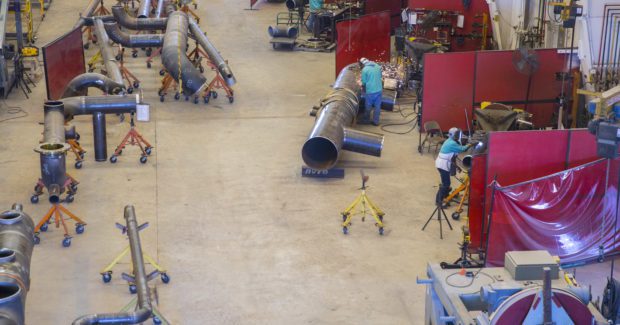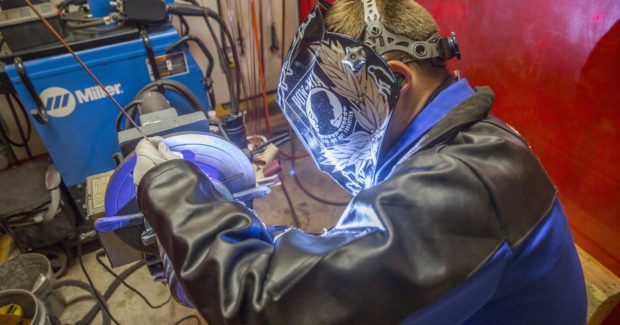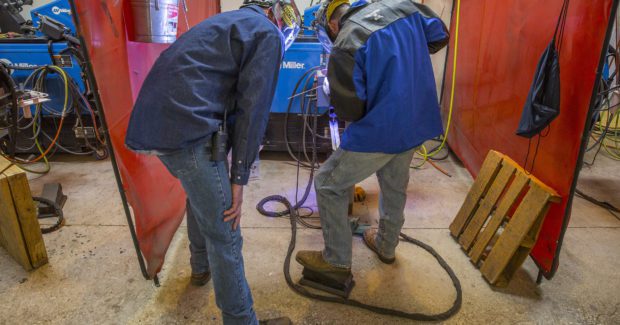Labor Shortage? How to Develop Welding Talent In-House
To compete in a hotbed of industrial construction and maintenance projects that require significant manpower, this fabrication shop has figured out how to meet customer demands while building a steady skilled workforce at the same time.
Posted: October 10, 2016
Training and retaining enough skilled welding operators to meet demand is a common challenge today for many fabrication shops and contractors that rely on welding in their operations. This is especially true in the highly competitive region of southeastern Texas, the home of some of the world’s largest refineries and many petrochemical and power plants, where a hotbed of industrial construction and maintenance projects require significant manpower, including welding operators.
Team Industries, Inc. (Port Arthur, TX) produces pipes and tanks for customers in all of those industries. This fabrication shop works to meet customer demands with on-time delivery of the highest quality products. However, a shortage of skilled labor has been an issue for Team, and that’s not all. Many of the welding jobs in the region require working on high-pressure pipe. Due to the critical nature of applications that use high-pressure pipe, any defects in the weld can result in cracking and eventual part failure, which can be catastrophic — causing ruptures, tank or valve explosions, or other serious incidents. As a result, codes and procedures for these applications are stringent.
The high amount of work within a 4-5 mile radius of the Team facility in Port Arthur means there can be about 5,000 manned jobs at any given time, which can make it difficult for the shop to find qualified people. On average, Team has about 15 welding operator positions open. To deal with this shortage, they launched an in-house training program to recruit and train skilled welding operators. The goal is that many of the students will work for the shop once they complete the 12-week program. The company views this training not as a short-term fix, but as a longer-term solution. They hope to gain the loyalty of the welders during the training program and build a steady workforce.
The program also allows the shop to train welding operators to their specific quality, standards and culture, which company leaders see as a plus. Team Industries launched this program with grant funding from the Port Arthur Economic Development Corporation and the Texas Workforce Commission. A new training session starts every 12 weeks with six students. When the program first started, Team received about ten applicants each time. But that has tripled now, with each session drawing from 30 to 40 applicants.
The company looks for students with some welding experience, though it’s not required. The students first learn TIG before moving on to flux-cored and MIG welding. They must pass a certification test once each process is covered. Once they finish the program, the shop gradually moves them up in jobs with Team Industries, which pays the students during training as one incentive to help draw interest. The program runs four days a week, for ten hours a day, but many of the students practice in the welding booths during their off hours. The focus of the program is to create welders with a good base of knowledge they can build upon. Students like that the training gives them a leg up, with the real experience they need to get a welding job.
One critical part of the training program is having welding equipment that offers ease of use for new welding operators. The training booths in this shop are equipped with the Miller® PipeWorx 400 welding system, a multi-process machine that lets students TIG, MIG, flux-cored and stick weld. The digital interface makes setup and adjustments quick and easy. The PipeWorx system also offers push-button changeover between processes. The machine sets amperage and voltage once the process is selected and provides a consistent, stable arc so that students can focus on technique and fundamentals.
The in-house training has been so successful that Team has applied for additional grant funding to expand the program from six to 12 welding booths. One of the largest benefits for the company is that students who have gone through their program are finding jobs — and Team is hiring many of them at the Port Arthur facility to help the shop meet demand. The investment in this type of training model could benefit other shops as well, and help more companies meet their need for skilled welding operators in a competitive environment.
Team Industries, Inc., 650 Main Avenue, Port Arthur, Texas 77642, 409-962-0266, Fax: 409-962-1387, www.teamind.com.


















